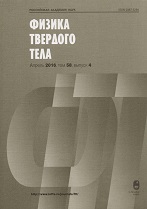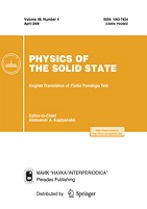|
This article is cited in 2 scientific papers (total in 2 papers)
Metals
Effect of hydrogenation on magnetostriction and magnetocaloric effect in gadolinium single crystal
I. S. Tereshinaa, G. A. Politovabc, V. A. Chetyrbotskiya, E. A. Tereshina-Chitrovade, M. A. Paukovfd, A. V. Andreeve
a Lomonosov Moscow State University
b Baikov Institute of Metallurgy and Materials Science, Russian Academy of Sciences
c Peter the Great St. Petersburg Polytechnic University
d Charles University, Prague, Czech Republic
e Institute of Physics, Czech Academy of Sciences, Prague, Czech Republic
f Immanuel Kant Baltic Federal University, Kaliningrad
Abstract:
The gadolinium single crystal obtained by the Czochralski method was hydrogenated to the composition GdH$_{0.15}$, which corresponds to a metal–hydrogen solid solution ($\alpha$ phase). The magnetostriction and magnetocaloric effect were measured for both the initial and hydrogenated samples. It is found that the hydrogen atoms in the hexagonal lattice of gadolinium can affect the magnitude and sign of the magnetostriction constants and cause the anisotropy of the magnetocaloric effect. The main mechanisms responsible for the observed effects are discussed.
Received: 10.09.2018
Citation:
I. S. Tereshina, G. A. Politova, V. A. Chetyrbotskiy, E. A. Tereshina-Chitrova, M. A. Paukov, A. V. Andreev, “Effect of hydrogenation on magnetostriction and magnetocaloric effect in gadolinium single crystal”, Fizika Tverdogo Tela, 61:2 (2019), 230–233; Phys. Solid State, 61:2 (2019), 90–93
Linking options:
https://www.mathnet.ru/eng/ftt8909 https://www.mathnet.ru/eng/ftt/v61/i2/p230
|


| Statistics & downloads: |
| Abstract page: | 126 | | Full-text PDF : | 53 |
|





 Contact us:
Contact us: Terms of Use
Terms of Use
 Registration to the website
Registration to the website Logotypes
Logotypes








 Citation in format
Citation in format 
